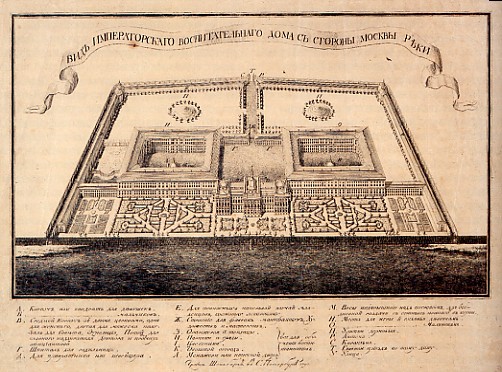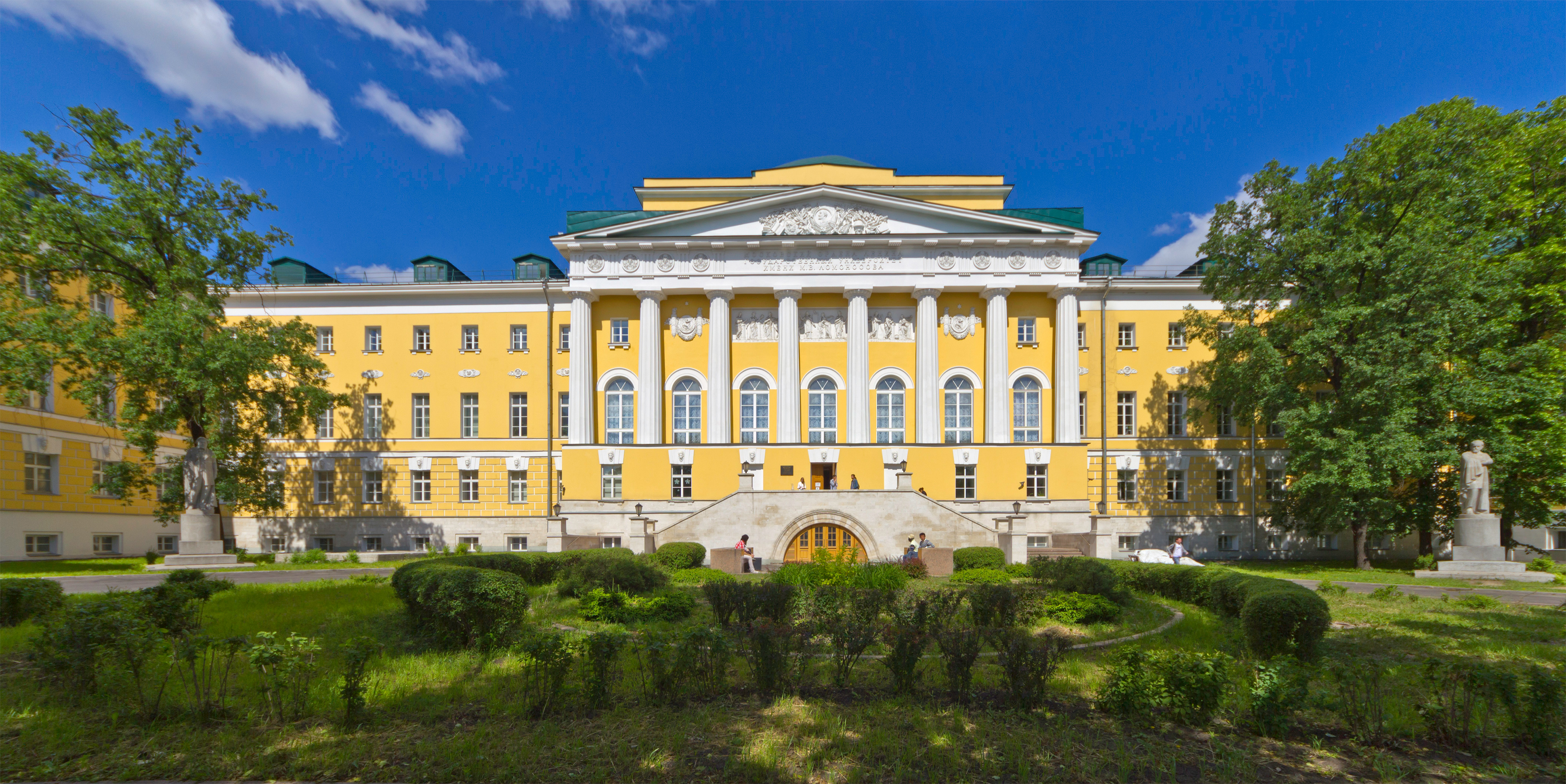|
Moskvoretskaya Embankment
Moskvoretskaya Embankment (russian: Москворецкая Набережная) is a major street, located in the Kitay-Gorod administrative district in central Moscow, running along the Moskva River. It stretches from Kremlin Embankment, near Red Square in the west, until the mouth of Yauza River in the east. The avenue ends close to one of Joseph Stalin's Seven Sisters building on the Kotelnicheskaya Embankment. Nearly a kilometer long, until recently the embankment housed only two structures - Rossiya Hotel (demolished 2006-2007), and the historical Moscow Orphanage. Rossiya Hotel The enormous Rossiya Hotel stood adjacent to the Moscow Kremlin. The hotel was one of the largest in the world, and was built in 1967 at the order of Nikita Khrushchev, in the Soviet-era. Demolition began in spring 2006 and continues into 2007. City plans to replace Rossiya with a mixed low-rise block of hotels and offices. The Orphanage Another huge structure, extending 379 meters from Ross ... [...More Info...] [...Related Items...] OR: [Wikipedia] [Google] [Baidu] |
Bolshoy Moskvoretsky Bridge
Bolshoy Moskvoretsky Bridge (russian: Большой Москворецкий мост, link=no) is a concrete arch bridge that spans the Moskva River in Moscow, Russia, immediately east of the Kremlin. The bridge connects Red Square with Bolshaya Ordynka Street in Zamoskvorechye. Built in 1936–1937, it was designed by V. S. Kirillov (structural engineering) and Alexey Shchusev (architectural design). Moskvoretsky bridge (1829/1872, demolished) Wooden bridges east of the Kremlin have existed since the fifteenth century, as witnessed by Venetian Ambrogio Contarini, who travelled through Moscow in 1476. The first permanent Moskvoretsky bridge was built in 1829, about west of the present site. Three wooden arches, each long, were supported by stone abutments. It was loosely based on Kamennoostrovsky Bridge in Saint Petersburg designed by Agustín de Betancourt. The bridge burned down in 1871; after the fire, steel arches and decking were installed on the old abutments. Bolsho ... [...More Info...] [...Related Items...] OR: [Wikipedia] [Google] [Baidu] |
Rossiya Hotel
The Rossiya Hotel (russian: Гостиница «Россия») was a five-star international hotel in Moscow. It was the largest hotel in the world from 1967 to 1980. Until its closure in 2006, it remained the second largest hotel in Europe, with 3,182 rooms. Throughout its existence, the hotel welcomed about ten million guests, including more than two million foreigners. Famous hotel guests included Mikhail Gorbachev, George H. W. Bush and Mike Tyson. History The Rossiya Hotel was built in Moscow from 1964 until 1967 at the order of the Soviet government. Construction used the existing foundations of a cancelled skyscraper project, the Zaryadye Administrative Building, which would have been the eighth of what are now referred to as the "Seven Sisters". One of the prerequisites for the construction of the new tourist complex in Moscow was a lack of hotel rooms. This became especially important after the construction of the State Kremlin Palace. The projected hotel had to ... [...More Info...] [...Related Items...] OR: [Wikipedia] [Google] [Baidu] |
Yevgeny Tarle
Yevgeny Viktorovich Tarle (russian: Евгений Викторович Тарле) ( – 6 January 1955) was a Soviet historian and academician of the Russian Academy of Sciences. He is known for his books about Napoleon's invasion of Russia and on the Crimean War, as well as many other works. Yevgeny Tarle was one of the founders of the Moscow State Institute of International Relations, Russia's diplomatic university. Life Born as Grigory Tarle in Kyiv, Russian Empire (modern-day Ukraine) into a prosperous Jewish family, he adopted the name of Yevgeny in 1893 following his baptism to Orthodox Christianity in Saint Sophia's Cathedral to marry Olga Grigorievna Mikhailova who belonged to Russian nobility. His father, Viktor Grigorievich Tarle, came from Merchantry Social Estate and ran a shop in Kyiv; he also translated books from Russian to German, including Fyodor Dostoyevsky's works. Yevgeny's mother, Rozalia Arnoldovna Tarle, was a housewife who dedicated herself to raisin ... [...More Info...] [...Related Items...] OR: [Wikipedia] [Google] [Baidu] |
Strategic Rocket Forces
The Strategic Rocket Forces of the Russian Federation or the Strategic Missile Forces of the Russian Federation (RVSN RF; russian: Ракетные войска стратегического назначения Российской Федерации (РВСН РФ), Raketnye voyska strategicheskogo naznacheniya Rossiyskoy Federatsii, lit. 'Strategic Purpose Rocketry Troops') are a separate-troops branch of the Russian Armed Forces that control Russia's land-based intercontinental ballistic missiles (ICBMs). The Strategic Rocket Forces was created on 17 December 1959 as part of the Soviet Armed Forces as the main force intended for attacking an enemy's offensive nuclear weapons, military facilities, and industrial infrastructure. They operated all Soviet nuclear ground-based intercontinental, intermediate-range ballistic missile, and medium-range ballistic missile with ranges over 1,000 kilometers. After the Soviet Union collapsed in 1991, assets of the Strategic Rock ... [...More Info...] [...Related Items...] OR: [Wikipedia] [Google] [Baidu] |
Fire Of Moscow (1812)
Fire is the rapid oxidation of a material (the fuel) in the exothermic chemical process of combustion, releasing heat, light, and various reaction products. At a certain point in the combustion reaction, called the ignition point, flames are produced. The ''flame'' is the visible portion of the fire. Flames consist primarily of carbon dioxide, water vapor, oxygen and nitrogen. If hot enough, the gases may become ionized to produce plasma. Depending on the substances alight, and any impurities outside, the color of the flame and the fire's intensity will be different. Fire in its most common form can result in conflagration, which has the potential to cause physical damage through burning. Fire is an important process that affects ecological systems around the globe. The positive effects of fire include stimulating growth and maintaining various ecological systems. Its negative effects include hazard to life and property, atmospheric pollution, and water contamination. If fi ... [...More Info...] [...Related Items...] OR: [Wikipedia] [Google] [Baidu] |
Domenico Giliardi
Domenico Gilardi (Доменико Жилярди, 1785–1845), was a Swiss people, Swiss architect who worked primarily in Moscow, Russia in Neoclassicism, Neoclassicist style. He was one of key architects charged with rebuilding the city after the Fire of Moscow (1812), Fire of 1812. Gilardi’s legacy survives in public buildings like Moscow Orphanage, Widows’ House, Catherine’s Institute and the Old Hall of Moscow State University, Moscow University. Early life The Gilardi family of architects, originally from Canton of Ticino, Ticino, established itself in Russia in the middle of the 18th century. Domenico’s father Giovanni, also known as ''Ivan Dementievich'', was well known in Moscow. Domenico was born in Montagnola and lived there until his mother brought him to Russia in 1796. Domenico longed for a career in painting, so in 1799, his father sent him to an Italian workshop in Saint Petersburg, St.Petersburg. After the death of Paul I of Russia, Paul I, dowager Em ... [...More Info...] [...Related Items...] OR: [Wikipedia] [Google] [Baidu] |
Giovanni Giliardi
Giovanni may refer to: * Giovanni (name), an Italian male given name and surname * Giovanni (meteorology), a Web interface for users to analyze NASA's gridded data * ''Don Giovanni'', a 1787 opera by Wolfgang Amadeus Mozart, based on the legend of Don Juan * Giovanni (Pokémon), boss of Team Rocket in the fictional world of Pokémon * Giovanni (World of Darkness), a group of vampires in ''Vampire: The Masquerade/World of Darkness'' roleplay and video game * "Giovanni", a song by Band-Maid from the 2021 album ''Unseen World'' * ''Giovanni's Island'', a 2014 Japanese anime drama film * ''Giovanni's Room'', a 1956 novel by James Baldwin * Via Giovanni, places in Rome See also * * *Geovani *Giovanni Battista *San Giovanni (other) *San Giovanni Battista (other) {{disambig ... [...More Info...] [...Related Items...] OR: [Wikipedia] [Google] [Baidu] |
Carl Blank
Carl may refer to: *Carl, Georgia, city in USA *Carl, West Virginia, an unincorporated community *Carl (name), includes info about the name, variations of the name, and a list of people with the name *Carl², a TV series * "Carl", an episode of television series ''Aqua Teen Hunger Force'' * An informal nickname for a student or alum of Carleton College CARL may refer to: *Canadian Association of Research Libraries *Colorado Alliance of Research Libraries See also *Carle (other) *Charles *Carle, a surname *Karl (other) *Karle (other) Karle may refer to: Places * Karle (Svitavy District), a municipality and village in the Czech Republic * Karli, India, a town in Maharashtra, India ** Karla Caves, a complex of Buddhist cave shrines * Karle, Belgaum, a settlement in Belgaum d ... {{disambig ja:カール zh:卡尔 ... [...More Info...] [...Related Items...] OR: [Wikipedia] [Google] [Baidu] |
Catherine The Great
, en, Catherine Alexeievna Romanova, link=yes , house = , father = Christian August, Prince of Anhalt-Zerbst , mother = Joanna Elisabeth of Holstein-Gottorp , birth_date = , birth_name = Princess Sophie of Anhalt-Zerbst , birth_place = Stettin, Pomerania, Prussia, Holy Roman Empire(now Szczecin, Poland) , death_date = (aged 67) , death_place = Winter Palace, Saint Petersburg, Russian Empire , burial_date = , burial_place = Saints Peter and Paul Cathedral, Saint Petersburg , signature = Catherine The Great Signature.svg , religion = Catherine II (born Sophie of Anhalt-Zerbst; 2 May 172917 November 1796), most commonly known as Catherine the Great, was the reigning empress of Russia from 1762 to 1796. She came to power following the overthrow of her husband, Peter III. Under her long reign, inspired by the ideas of the Enlightenment, Russia experienced a renaissance of culture and sciences, which led to the founding of m ... [...More Info...] [...Related Items...] OR: [Wikipedia] [Google] [Baidu] |
Ivan Betzkoy
Ivan Ivanovich Betskoi or Betskoy (russian: Ива́н Ива́нович Бе́цкой; ) was an educational reformer in the Russian Empire who served as Catherine II's advisor on education and President of the Imperial Academy of Arts for thirty years (1764–94). Perhaps the crowning achievement of his long career was the establishment of Russia's first unified system of public education. Life Betskoy's parents were Prince Ivan Trubetskoy, a Russian field marshal, and his Swedish mistress, Baroness von Wrede. His surname is the abbreviated form of his father's. He was born in Stockholm, where Trubetskoy was held captive throughout the Great Northern War, and went to Copenhagen to get a military education before joining a Danish cavalry regiment. It was in the Danish service that he sustained a fall from a horse which forced him to retire from the service. Field Marshal Trubetskoy, having no other sons but Betskoy, called him to the Russian Empire in 1729. At first he serv ... [...More Info...] [...Related Items...] OR: [Wikipedia] [Google] [Baidu] |
Soviet Union
The Soviet Union,. officially the Union of Soviet Socialist Republics. (USSR),. was a transcontinental country that spanned much of Eurasia from 1922 to 1991. A flagship communist state, it was nominally a federal union of fifteen national republics; in practice, both its government and its economy were highly centralized until its final years. It was a one-party state governed by the Communist Party of the Soviet Union, with the city of Moscow serving as its capital as well as that of its largest and most populous republic: the Russian SFSR. Other major cities included Leningrad (Russian SFSR), Kiev (Ukrainian SSR), Minsk ( Byelorussian SSR), Tashkent (Uzbek SSR), Alma-Ata (Kazakh SSR), and Novosibirsk (Russian SFSR). It was the largest country in the world, covering over and spanning eleven time zones. The country's roots lay in the October Revolution of 1917, when the Bolsheviks, under the leadership of Vladimir Lenin, overthrew the Russian Provisional Government ... [...More Info...] [...Related Items...] OR: [Wikipedia] [Google] [Baidu] |







.jpg)